One of the easiest ways to improve the effectiveness of your sales calls is to have an airtight sales voicemail script ready to go.
.jpg)
In this guide, you’ll learn how to create powerful and effective voicemail scripts that elicit responses. From key elements you must include to actionable tips that improve your execution, this post will teach you everything you need to know.
Let’s get started.
Elements of an Effective Sales Voicemail
Actionable Tips for Creating and Executing a Sales Voicemail Script
10 Sales Voicemail Scripts and Templates
How to Optimize Your Sales Voicemail Script
Elements of an Effective Sales Voicemail Script
Although voicemail scripts will (and should) vary based on several factors, certain elements must be included across all voicemails regardless of context.
1. Your Name and Company Affiliation
Who are you and what company are you calling on behalf of?
Regardless of whether you are calling an individual you have or haven’t spoken with before, sharing this information is important to help provide context for your prospect.
Aside from this, nuances such as whether you share this information at the beginning or end of the call can be left to your discretion as a salesperson.
2. Your Phone Number
Calling out your phone number within the body of your message is best practice.
Although your prospects can find this information through caller ID, the goal of dictating your number is to reduce the effort required to respond to your message.
Aside from simply calling out your number, some salespeople also recommend that you do so twice — earlier in the message and at the end — in case your recipient doesn’t listen to your message all the way through.
3. Your Reason for Calling
State the intention of your message and do so clearly. A great way to do this is by sharing why you’re reaching out to the prospect.
Did they leave an inquiry on your website or download a lead magnet?
Did a mutual acquaintance suggest you reach out to them?
By creating relevance and context, it becomes much easier to grab the prospect’s attention.
4. The Benefits of Calling You Back
Your goal when leaving a voicemail should never be to sell to your prospect. Instead, your focus should be on incentivizing them to return your call.
This means that a good voicemail should be more about the prospect than the salesperson — especially when cold-calling.
How can you help or add value to this person’s business? Can you help them save time or make more money? If possible, mention tangible benefits the prospect can gain by working with you.
But remember not to get bogged down in features and tools. Instead, convey concrete benefits such as results from past customers, how much they can expect to earn or save, etc.
The priority here is grabbing your prospect's attention and getting them to respond to your message. The nitty-gritty details can be discussed later down the line.
5. What You Want the Prospect to Do or Expect
After a prospect finishes listening to your voicemail, they should be very clear on what next steps to take.
Whether that’s calling you back or looking out for a follow-up email, the message recipient should know exactly what’s coming next, and what to do if they are interested in moving forward with the conversation.
To keep the sale moving, you need to be as specific as possible — even down to your availability.
If you’re asking the prospect to call you back, let them know if there’s a good time to reach you. It can be as simple as “You can give me a call back at XYZ-1234. I am typically available Monday through Friday from 9 AM to 3 PM.”
Essentially you want to avoid ending your voicemails with vague statements or instructions such as “The ball is in your court. Please get back to me when you’re free.”
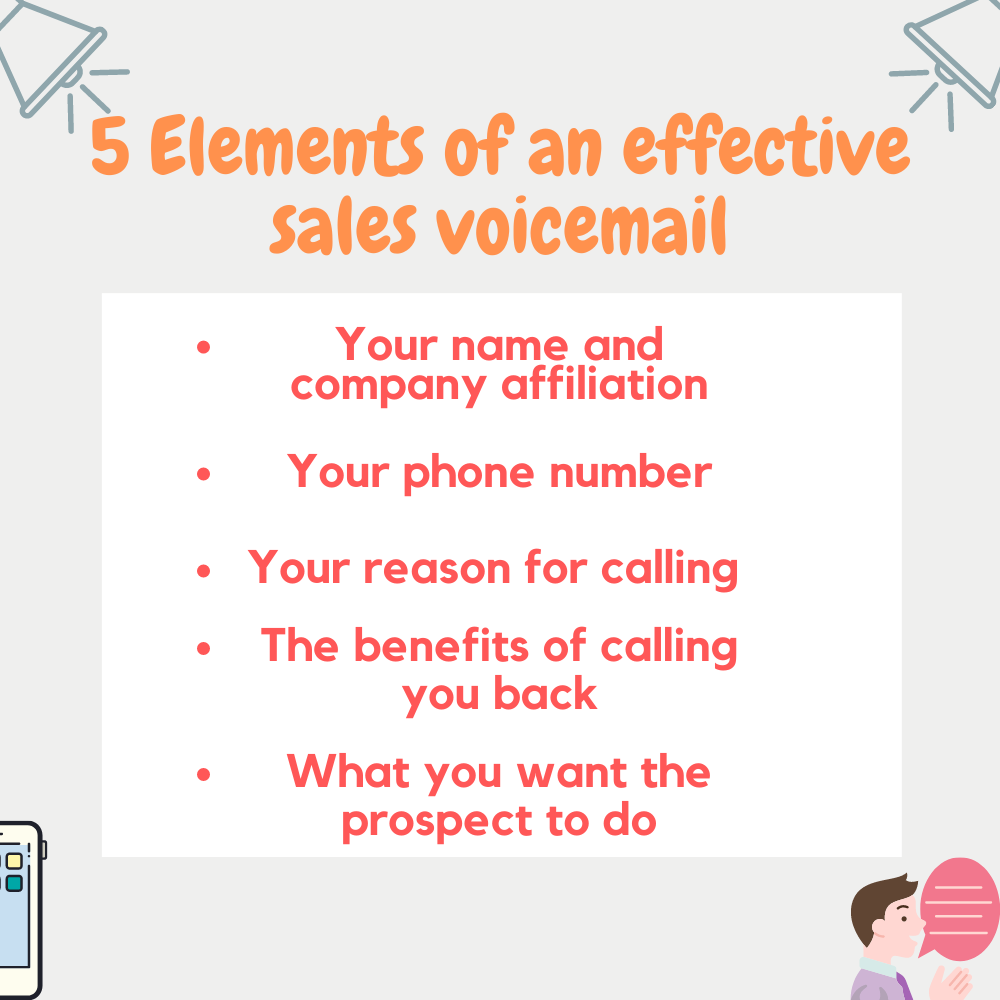
Actionable Tips for Creating and Executing a Sales Voicemail Script
Now that you understand the basics of what needs to be included in your voicemail script, it’s time to discuss tips to help you improve the effectiveness of your script.
Tip 1. Be concise.
Too many reps are the inside sales equivalent of chatty grandmas — pitching solutions, discussing features, and sharing lengthy value propositions over voicemail.
Often, this leads to long rambling messages.
Instead, best practice says to keep your message under 30 seconds.
This is the sweet spot to prevent potentially getting cut off by the recipient’s voice mailbox system, or having the listener hang up early because your message was simply too long.
Save your sales pitch for an actual sales call. Get straight to the point as soon as possible.
Tip 2. Research your prospect.
Although you will be working with a script, it is still important to ensure every message is personalized to the recipient.
The information you gather during your research is instrumental in crafting a message that is highly relevant and elicits a response. Be sure to note the customer’s pain points, competitors, recent internal changes within the prospect’s organization, and what specific business metrics matter to your prospect.
Another thing you might want to research, especially when cold-calling, is whether you can find any connections within the prospect’s organization.
Simply mentioning an internal connection can be a great way to warm up your message and create a sense of familiarity.
Tip 3. Be mindful of your tone and delivery.
Here are some general rules to keep in mind when executing your script.
Keep your tone mellow and steady.
If you sound too relaxed or overly familiar, you might come across as unprofessional. Likewise, if your tone is all over the place, you might come across as overenthusiastic and sales-y.
On the flip side, if you sound rigid or robotic, your message might come off as impersonal.
A good rule is to keep your tone conversational and try to speak to your prospect like you would a business colleague.
Don’t be afraid to vary your cadence.
Make use of strategic pauses, and change the speed of your delivery to emphasize key parts of your message.
Prepare before you pick up the phone.
You don’t want to cough into the receiver or sound hoarse. As a general tip, drink water and clear your throat before sales calls.
Say your number twice.
When saying your phone number, consider dictating it twice and differently each time. For example: “Call me back at 8-7-7-9-7-7-8-0-8-0. Again, that is 8-7-7-9-77-80-80.”
Keep confident.
Finally, make sure to exude confidence throughout your delivery. This means you want to keep the “maybes” and “ums” to a minimum.
Tip 4. Avoid sales speak and buzzwords.
Many qualified prospects don’t mind hearing from sales reps as long as they’re helpful, knowledgeable, and demonstrate integrity.
However, if you approach a sales voicemail like a used-car salesman, your prospects are going to delete your messages faster than you can say “lowest price guaranteed”.
Remember, you aren’t trying to sell them anything (yet). You’re simply there to communicate how you can add value.
This also means that you want to avoid technical jargon.
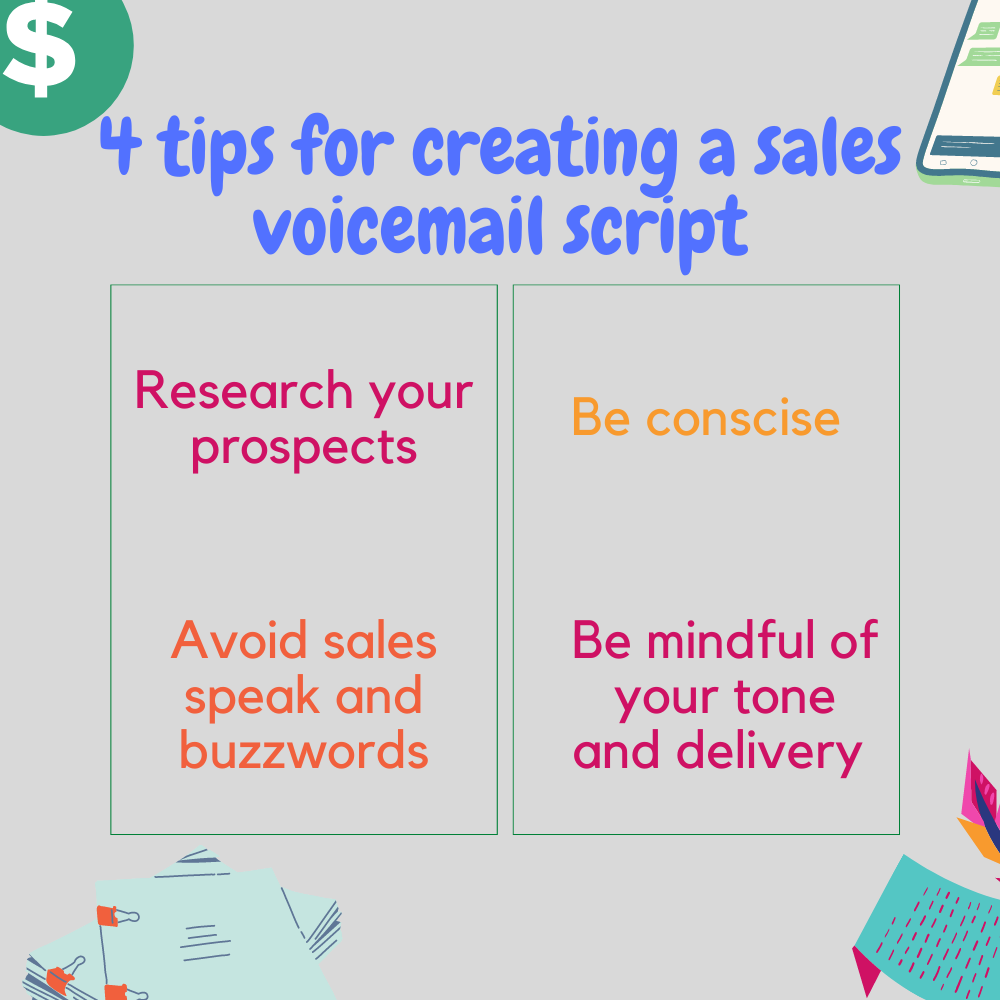
10 Sales Voicemail Scripts (with Real-World Examples)
While there isn’t a magic sales voicemail script that guarantees a 100% response rate, there are templates that can significantly improve your odds of getting that oh-so-elusive callback.
Here are 10 voicemail scripts tailored specifically to the four most prevalent scenarios you’re likely to come across as a salesperson.
Sales Voicemail Scripts for Reaching Out to Prospective Buyers
Strategy 1: Establish relevance.
Marc Wayshak, bestselling author of The High-Velocity Sales Organization, shared his scripts for sales voicemails with Sales Insights Lab. You can see the script below.
Hi, [prospect’s name], [your name], [your phone number].
I just emailed you a brief report I put together on [the prospect’s company] that will show you some of your strategic strengths and weaknesses. I think you’ll find it useful given [reason].
If you find the report useful, just shoot me a message back — and I can give you some more insight.
Again, this is [your name], [your phone number].
Here’s what this script looks like in action.
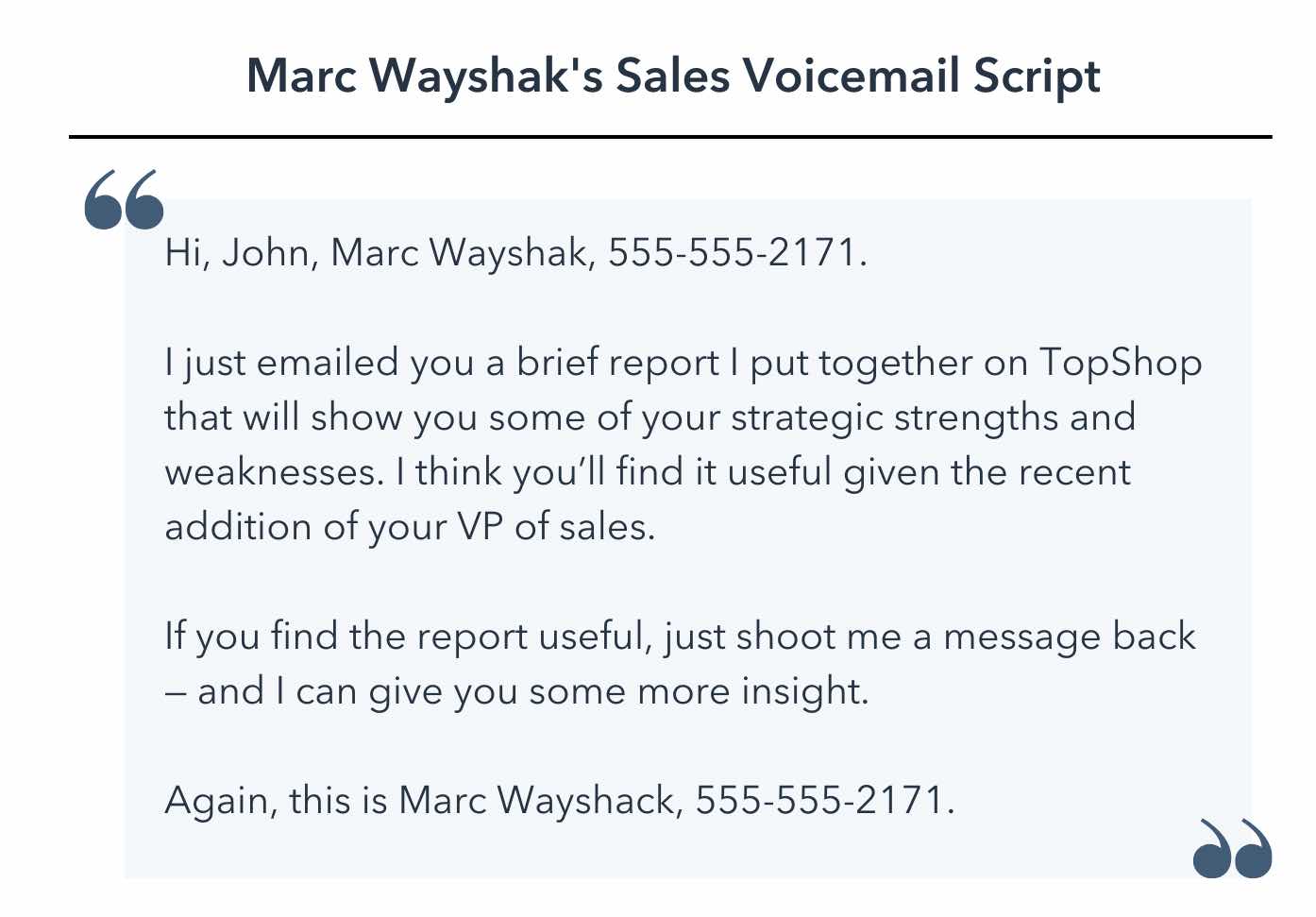
Why This Strategy Works
The main strategy here is to make the voicemail hyper-relevant to the prospect.
By sharing that the caller put together a tailored report and mentioning a recent change in the structure of the prospect’s organization, it demonstrates that the caller knows and cares about the prospect.
It makes the receiver think, “This doesn’t sound like a mass-delivered campaign. Maybe this person could help my company.”
Strategy 2: Build familiarity.
Matt Easton, a sales coach of Easton University, shared his most effective voicemail script in a recent YouTube video.
“Hey, [prospect’s name], this is [your name] with [company]. You and I [how/why/when you connected].
I wanted to reach out to you personally ’cause I’ve got an idea that may be a game-changer for you, but I’m not sure.
Can you give me a call back on my mobile [your phone number]?”
Here’s what this script looks like in action.
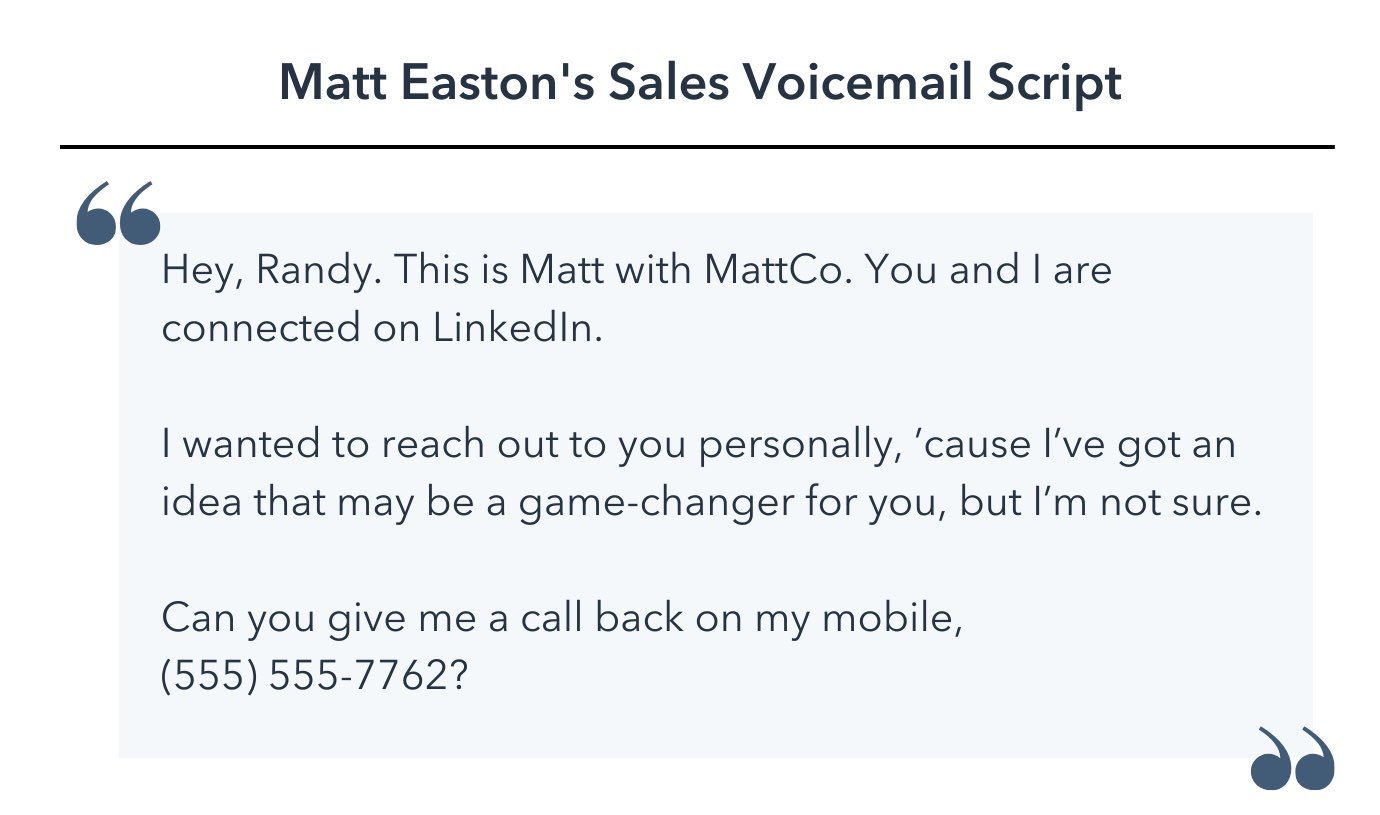
Why This Strategy Works
By establishing a connection, the prospect mentally re-categorizes the caller from “complete stranger that’s calling” to “acquaintance that’s reaching out.”
According to Matt, this script also works particularly well for several reasons.
- The phrase “reach out personally” conveys that the caller is someone of importance who decided to take out time specifically for this prospect.
- The phrase “I’m not sure” subtly conveys that the caller isn’t concerned with simply “peddling a solution” or “making a sale.” Instead, they want to be sure that the idea could benefit the prospect.
- Finally, asking the prospect to “give me a call back on my mobile” once again establishes a sense of familiarity between the caller and the prospect.
Strategy 3: Create FOMO.
When buyers feel FOMO, they are more likely to act urgenty. John Barrow taps into that instinct with this voicemail script.
“Hi, [prospect’s name], the reason for my call is that one of my clients similar to you used my sales training to [insert result].
I’d love to share with you how they did it to see if we can produce the same results for you.
Could you call me back at [your phone number]? This is [your name] with [company].”
Here’s what this script looks like in action.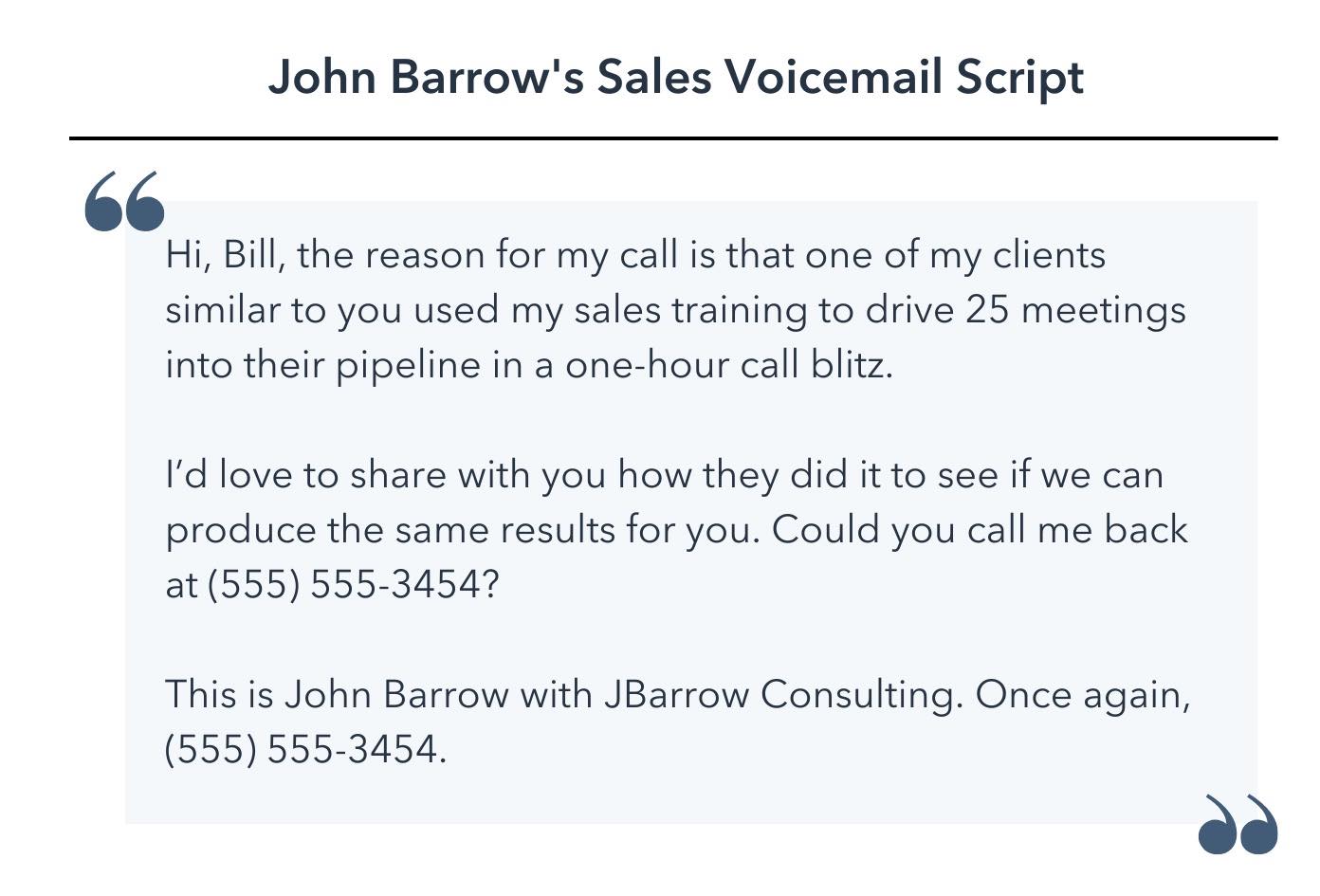
Why This Strategy Works
This script works because it not only shows how the caller can provide value but also does so in a way that is hyper-relevant to the prospect.
By sharing that a client “similar to the prospect” achieved XYZ result, it makes the possibility of also achieving those results feel more realistic for the prospect.
But what’s even more powerful is that the caller finishes the voicemail with a fantastic closer — “I’d love to share with you how they did it to see if we can produce the same results for you.”
No hard selling. No strings attached. Just the promise of immense value.
Strategy 4: Warm up your prospects.
Will Barron’s referral voicemail script gets prospects warmed up.
“Hi, [prospect’s name]. My name is [your name] calling from [your company]. [Referrer’s name] suggested I should book a meeting with you.
He gave me your details because we have helped them over at [referrer’s company] [insert specific benefit relevant to current prospect], and they think we can do the same for you.
I’ll send over an email right now with details on how [referrer’s name] thinks we can help you.
It’d be great to speak to you this week.”
Here’s what this script looks like in action.
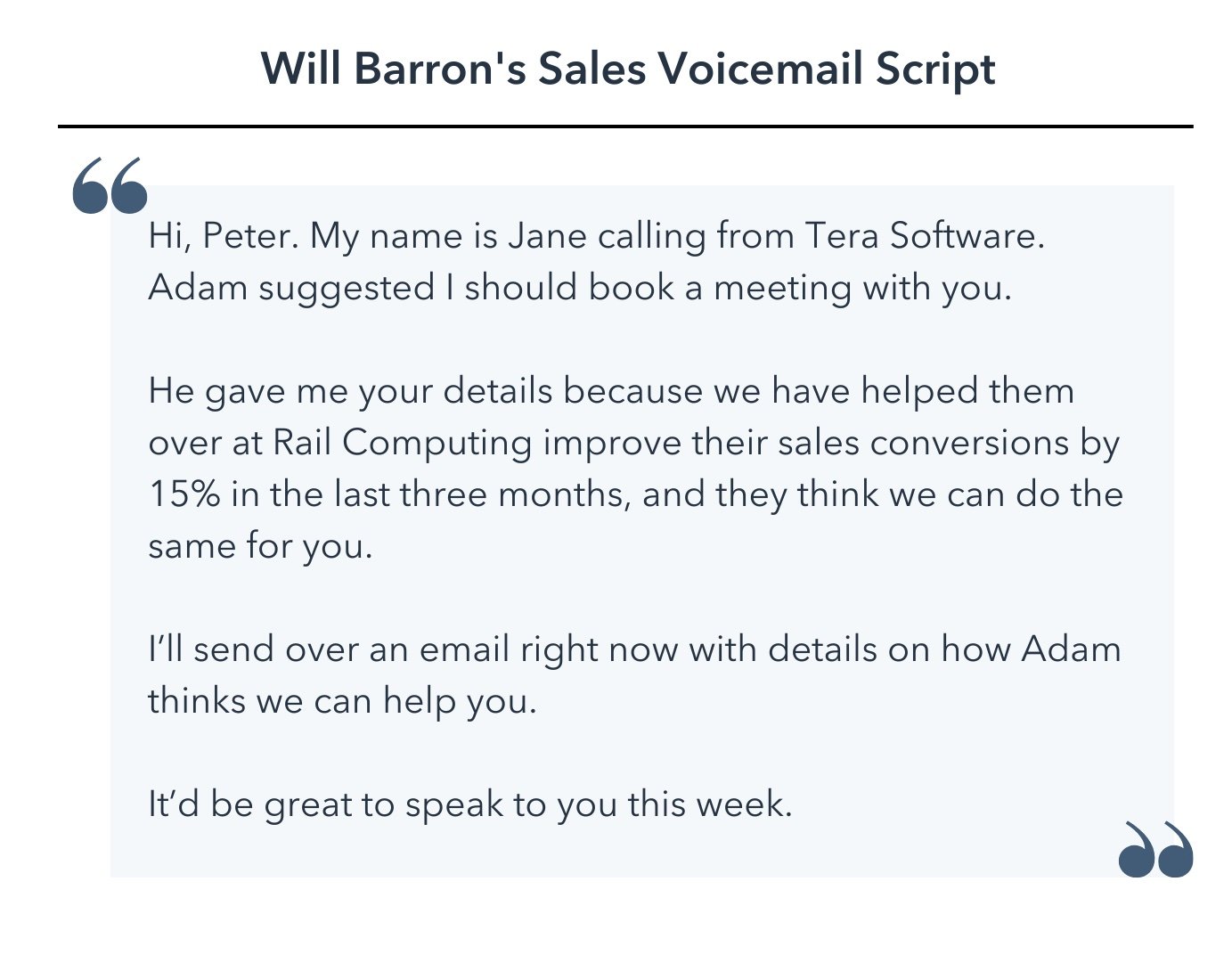
Why This Strategy Works
According to Will, this script works because it uses three principles of influence — social proof, likability, and authority.
In this case, social proof and likability were created by leveraging a mutual acquaintance (the referrer). Authority was established through sharing that the caller had initially solved a problem for the referrer.
Strategy 5. Grab their attention.
Matt Macnamara’s pattern-disruption voicemail script is designed to get the listener intrigued.
“[Prospect’s name], no need to call me back.
I’m about to send an email with the subject line [insert subject line]. When you get a minute, I’d appreciate it if you’d share some thoughts and feedback on that email.
It’s [your name] with [your company]. If I don’t hear back, I’ll call again next week.”
Here’s what this script looks like in action.
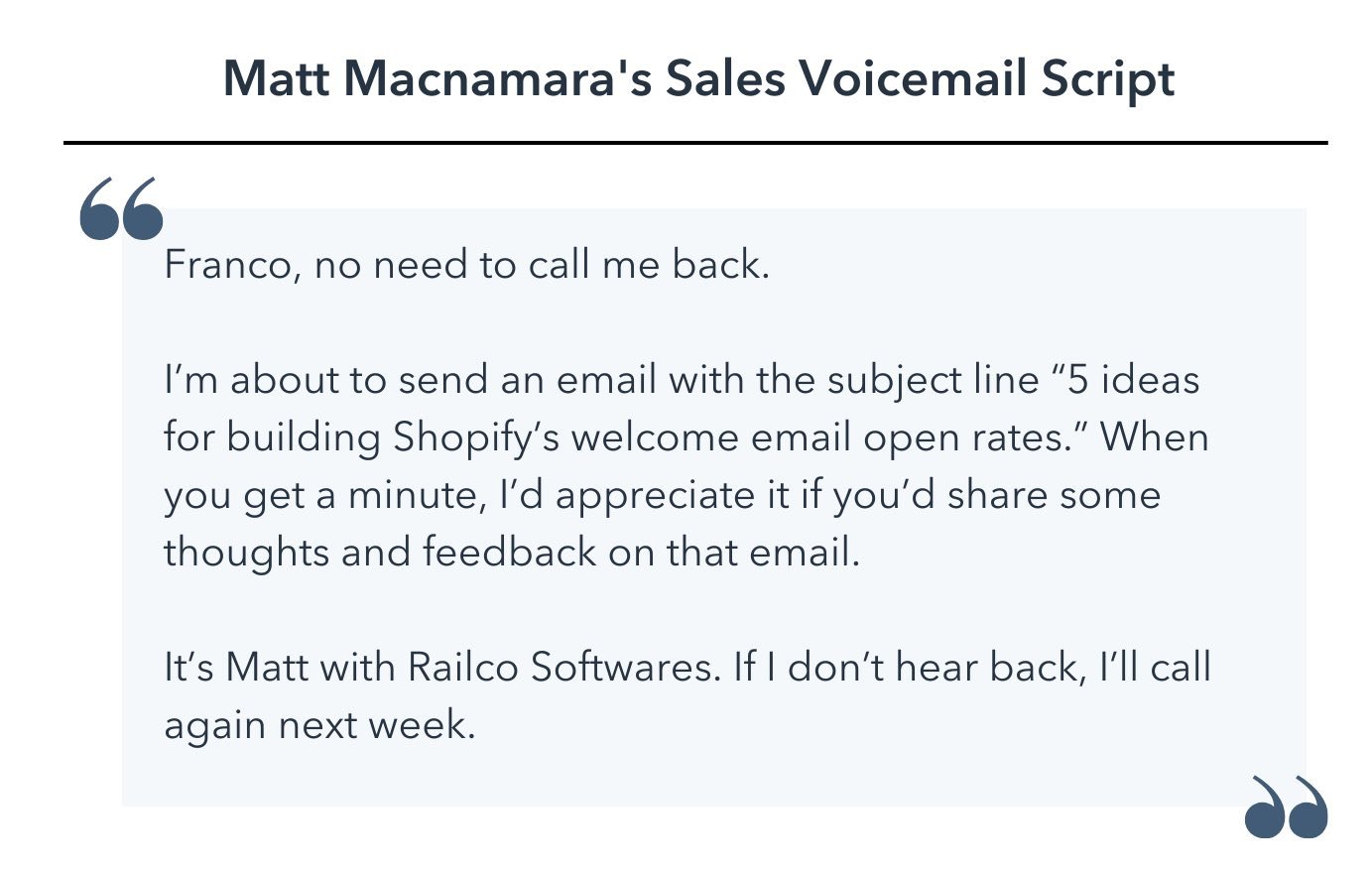
Why This Strategy Works
According to Matt, this script works for two reasons:
- This message starts with a pretty powerful pattern interruption — “you don’t need to call me back” — which means it’s likely to stand out to the prospect.
- By not asking for a call back, the caller has also eliminated the need for any immediate effort from the prospect.
Unlike most sales voicemail scripts, this one is designed to move the conversation away from the phone and to a channel that the prospect might be more receptive to: email.
2. Sales Voicemail Scripts for Following Up a Lead Inquiry
Let’s say a prospect has already made an inquiry, and you give them a call. Aged Lead Store shares a voicemail script that can help you out.
“[Prospect’s name], this is [your name] from [your company].
I’m just following up on the [the specific inquiry including where/how it was made].
I’m getting ready to send an email that’s got a lot more detail on [your company] and exactly how our process works, but let me tell you [insert value proposition relevant to the inquiry].
I’d love to tell you more about that.
We can follow up on a call — my number is [your phone number]. You can also text me on that number or just reply to my email.
Hope to talk to you soon; have a great day.”
Here’s what this script looks like in action.
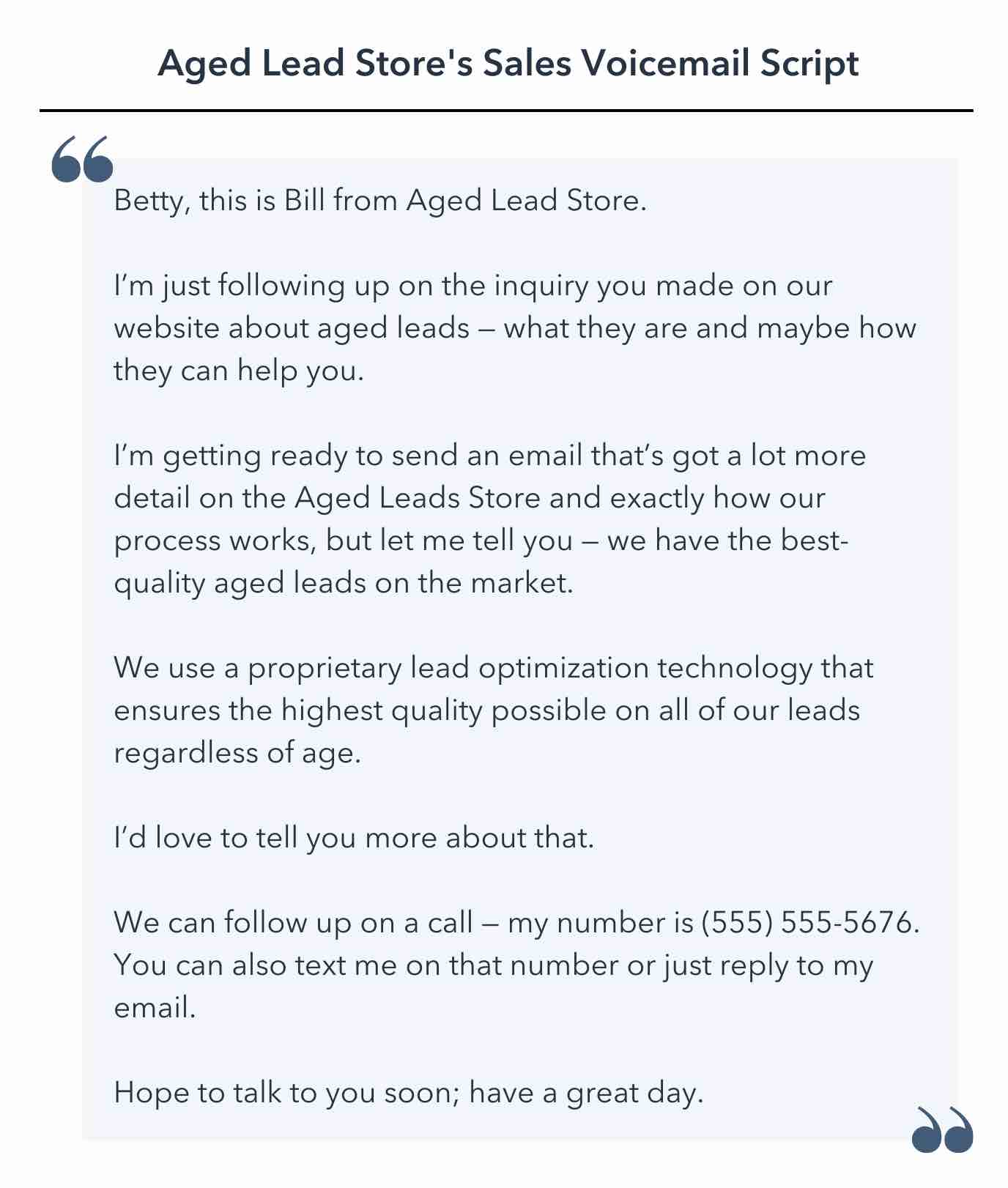
Why This Strategy Works
Following up on a lead that has indicated interest in your products or services requires a slightly different approach. Here are two things this script does differently from the previous ones:
- It clearly explains why the caller is reaching out and more specifically, the action the lead took that prompted them to reach out.
- It restates the value of the product or offering the prospect expressed interest in.
This voicemail also gives the lead two options regarding how they can respond to the message. This could potentially increase response rates as it provides a simple, low-effort alternative for people who are interested but might be in places or situations where they cannot take or make calls.
Sales Voicemail Scripts for Following Up on an Old Lead
No matter what you sell, this voicemail script from Real Estate Uncensored can help you re-engage an old prospect.
“Hey [prospect’s name]. This is [your name]. I’m a [your job title] with [your company].
I’m not sure if you remember or not, but about [insert time frame] you [insert how you got their information] and said [insert what they indicated an interest in].
I’m just trying to touch base with you to see if [insert question asking whether they are still interested in the product or service].
If you have [insert: “already purchased said product or service”], I don’t want to keep bothering you, so could you please get back to me and let me know where you are in the process?
Thank you so much. The best number for me is [your phone number]. I look forward to talking to you.”
Here’s what this script looks like in action.
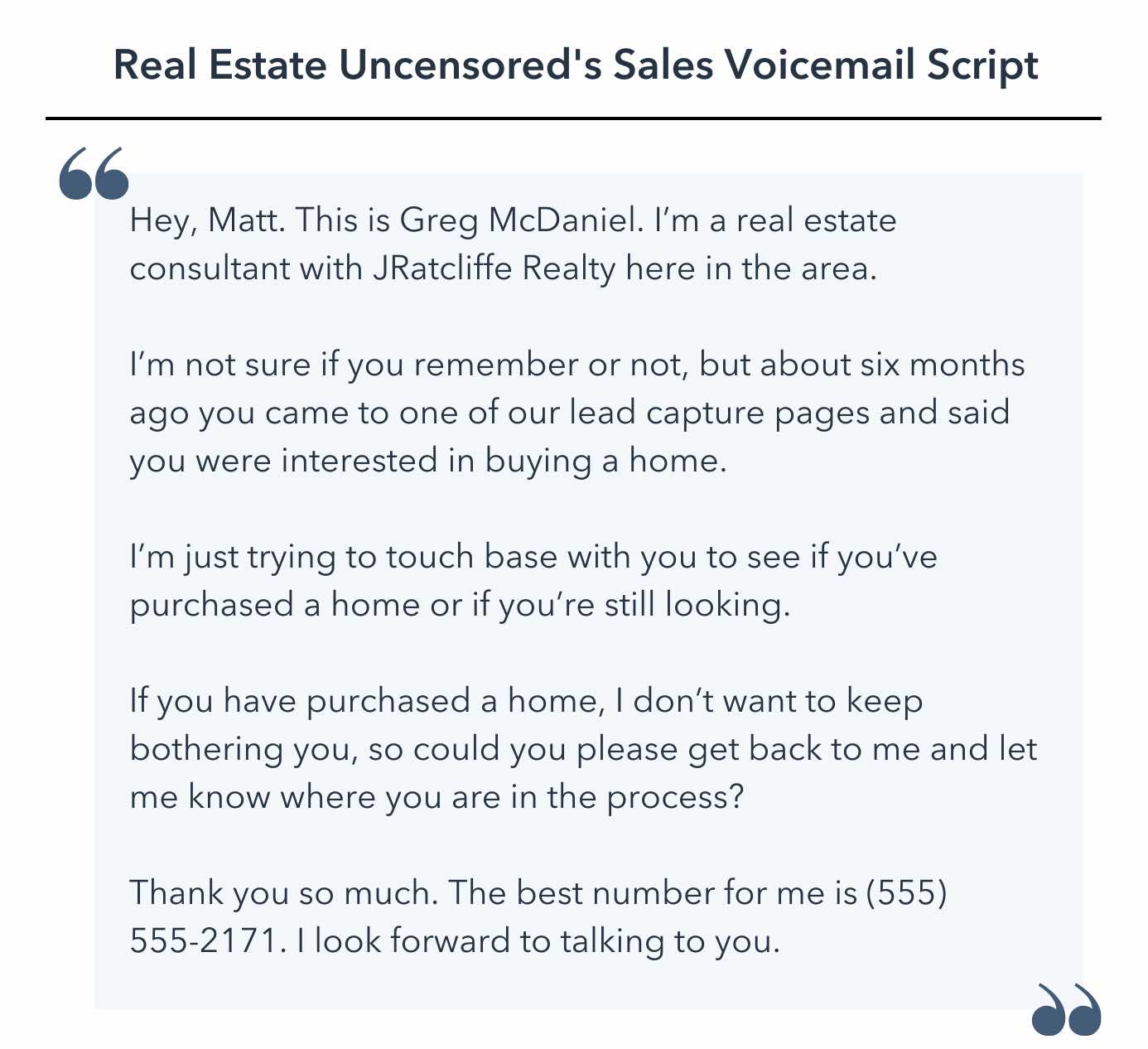
Why This Strategy Works
This script is pretty similar to the lead inquiry voicemail script. However, there is one detail that makes it particularly suited to old leads: It gives the lead an easy out.
This might seem counterintuitive. However, saying “I don’t want to keep bothering you” encourages the prospect to respond to your voicemail.
If the person is still interested in the offer, they’ll reach out because they think, “This person might not call again!”
On the other hand, if they’re no longer interested, they’ll probably reach out because they think, “I just have to let them know I’m not interested. If not, this person will keep calling me!”
Sales Voicemail Scripts for Dealing with Meeting No-Shows
No one likes being stood up, but in sales that’s sometimes the name of the game. When a prospect skips out on your meeting, you’ll need to give them a call. Tanya Aliza, a business success coach, shares three voicemails to help you address the situation.
The Call Immediately After the Meeting is Missed
“Hey, [prospect’s Name]. [Your name] here.
I’m calling you now at our scheduled appointment time, and I hope all is okay. I was expecting to chat with you.
Hey, listen — I’m free for the next [insert time limit]; I’ve blocked this time out for us in my schedule. Please call me back as soon as you get this message.”
Here’s what this script looks like in action.
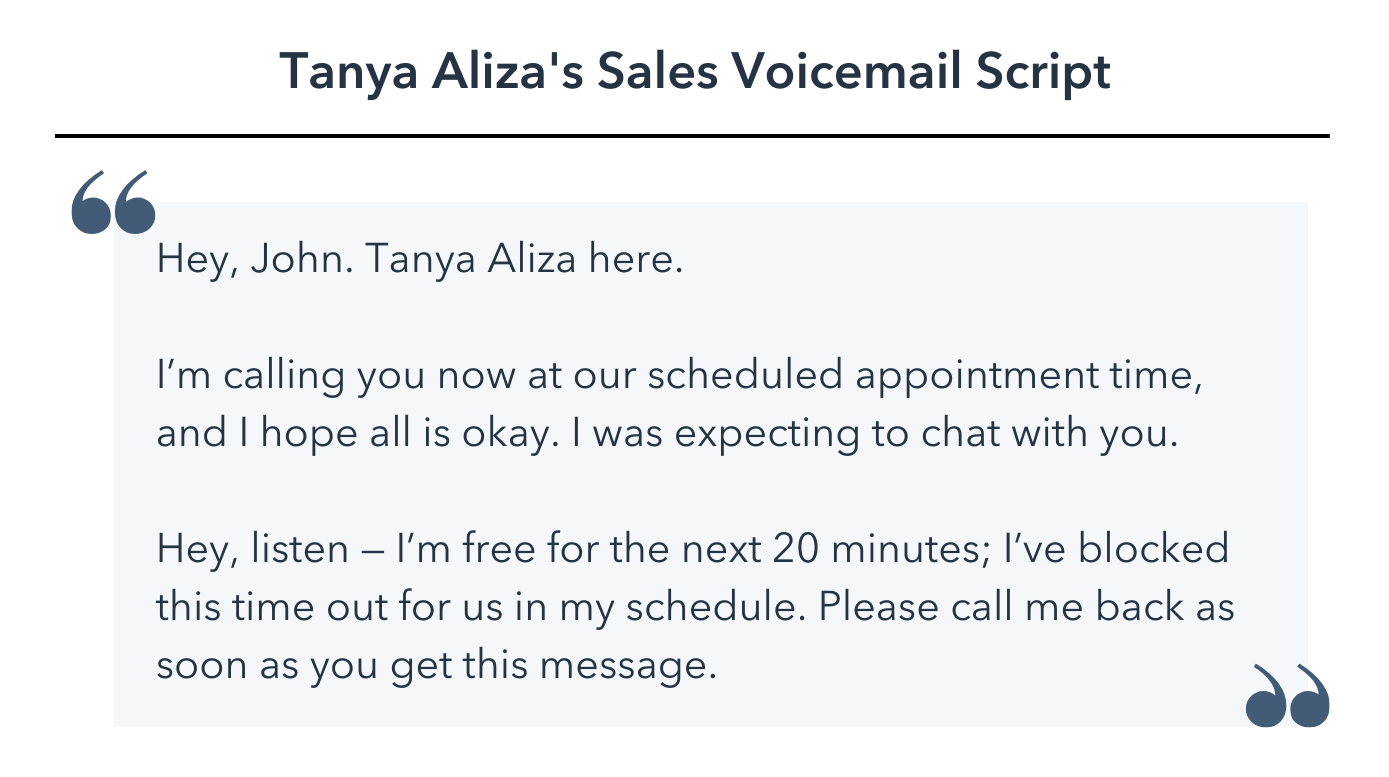
Why This Strategy Works
Perhaps your prospect had the date wrong on their calendar. Perhaps they were tied up with an emergency. This quick call is a great reminder so they can get in touch and reschedule as needed.
The Call a Couple of Hours Later
“Hey [prospect’s name]. [Your name] calling here again.
I haven’t heard from you since the last message that I left when we were scheduled to meet today, and I’m just calling because I hope everything is okay.
Can you please call me back as soon as you get this message today?.
Talk to you soon.”
Here’s what this script looks like in action.
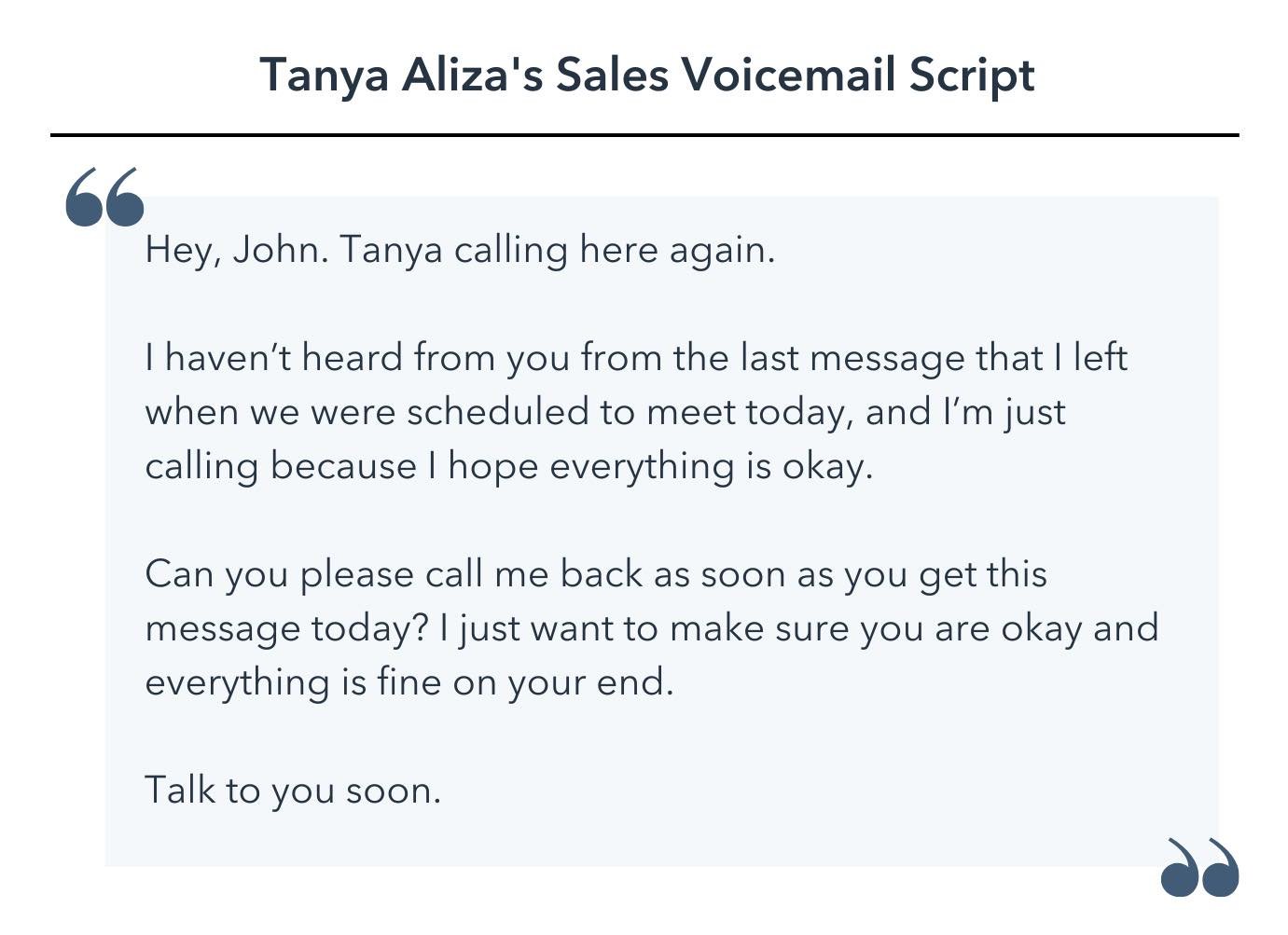
Why This Strategy Works
If you haven’t heard from your contact via a call or email, this email allows you to restart the conversation. The tone of concern will let your prospect know that there are no hard feelings — you care about them as a person not just a prospect.
The Call a Few Days After the Missed Appointment
“Hi, [prospect’s name]. It’s [your name] calling here again.
I left you a couple of voicemails yesterday regarding our scheduled appointment time that we had blocked off, and I haven’t heard back from you yet. I truly hope that everything is all right.
Hey, listen, here’s what I’m going to have to do for now — I’m going to have to cross you off my list for the time being.
I know you said you wanted help [insert pain point they needed help with], but I understand if maybe right now just isn’t the right time and that’s completely fine. If things change, just let me know.
But if you could also do me a quick favor and just send me a really quick text or call back so I do know that you’re okay.
If you could do that sometime today, that would be absolutely wonderful.
Have an awesome day.”
Here’s what this script looks like in action.
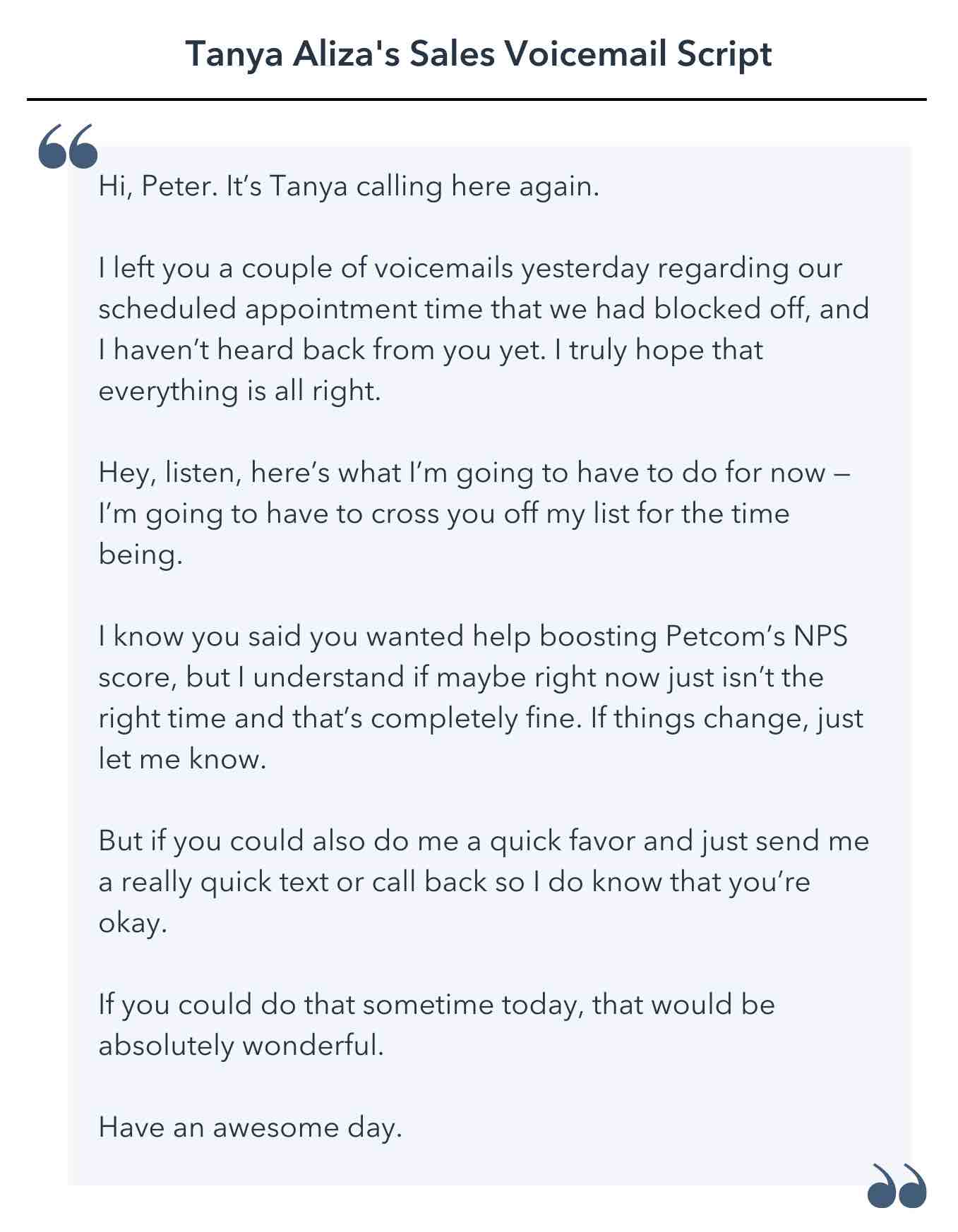
Why This Strategy Works
A meeting no-show can be a tricky situation. The goal of this script is to help the salesperson manage this situation in a way that perfectly toes the line between empathy and firmness.
The third script also does something similar when it says “I’m going to have to cross you off my list for the time being” but ends on a more empathetic note of “could you do me a quick favor and just send a quick text so I know that you’re okay.”
What makes this script interesting is how a more empathetic approach allows the salesperson to provide ample opportunities to get the deal back on the table without sounding — for lack of a better word — desperate.
How to Optimize Your Sales Voicemail Script
Truly becoming an expert in leaving effective sales voicemails requires much more than just creating scripts. These scripts (and the overall skill) must then be refined through rigorous testing, practice, and measurement.
Scheduled practice activities that offer ample opportunities for repetition and feedback. A great idea could be role-playing with colleagues and friends where they give honest feedback on your hypothetical voicemails.
You can also create a system to evaluate your voicemails moving forward. Start by creating a score sheet with a set rating system. Then, grade each voicemail by the following criteria:
- Would you save that voicemail?
- Would you return that call?
- Would you return that call right away?
- Was the message missing any of the basic elements discussed earlier?
- Was the message based on research?
Once completed, starting with the voicemails that score the lowest, begin identifying and working on areas of weakness in your script and delivery.
The goal here is to start consistently scoring high on these exercises.
The Art and Science of Sales Voicemails
All the above strategies go to show that leaving effective sales voicemails is both an art and a science.
By leveraging these tried-and-tested scripts, you can supercharge your efforts and drastically improve your response rates.
As you continue to refine these scripts (and your overall process), over time you’ll start to develop scripts and formulas of your own — unique to you and the niche you serve.
Sales Voicemails